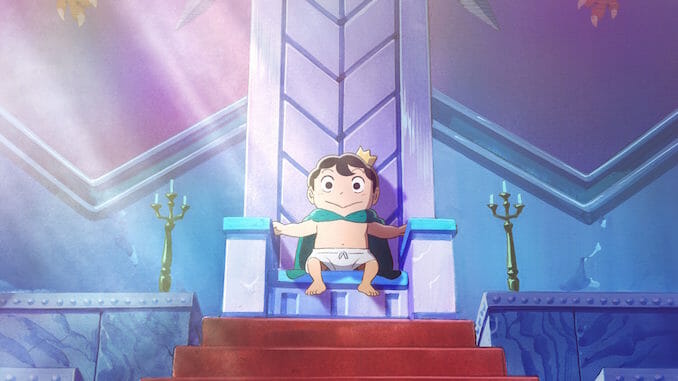Why the Throne for Best New Anime Belongs to Ranking of Kings

At first glance, with just an image of a young child in a diaper seated on a throne, one might mistake Ranking of Kings for nothing but another mediocre shonen anime that has hit it big in the United States. Or, for those who don’t engage with anime, something of a frivolous kids show.
But within just one episode, this adaptation of Sosuke Toka’s manga is bound to capture the attention of any viewer. It introduces us to the world of the series not exclusively through explanation, but through a lovely set of contrasting and complementary visuals. On one end lies the world at large, one of kings and heroes who seek to be recognized as the best of the best, and on the other, a young prince crying and being comforted by a motherly figure.
The words that close out the premiere’s cold opening, “you have to become the greatest king in the world,” are all the explanation one needs from the series for what to expect (and if you replace the word “king” with any other role, you’d have the description of any given shonen). Standing apart from the collection of tough shonen protagonists built for extensive fights is Bojji, a naive, deaf prince who can’t even lift a real sword and finds himself the target of everyone’s laughter. For all the company that surrounds him within his father’s kingdom, condescending gazes and comments coming from every individual he meets, Bojji’s sole friend in this world comes in the form of Kage, a shadow being and thief with a dark history who is just as lonely.
That the relationship between these two characters builds from exploitative to sincere isn’t quite so surprising, with Kage being one of the few individuals who can understand Bojji without the use of sign language, but the way the series depicts their connection and builds upon their goofy dynamic is one of its strengths. The pivot from Kage outright making fun of Bojji by saying, “You can’t hear and you’re an idiot, so nobody engages with you,” to actively cheering him on and defending him in the presence of danger isn’t forced, coming as naturally as possible within just a few episodes. After all, in a world in which the true danger exists within your own family, even more so than the world at large, who better to find comfort in than another outcast?
From the first episode, “The Prince’s New Clothes,” it’s clear that the bulk of the action will take place between Bojji and those closest to him (both his family and those who live to serve them), but what the series does so exquisitely is introduce seemingly questionable characters through one perspective only to slowly but surely peel back their cold facades. Take the way Prince Daida and his mother (Bojji’s stepmother) Queen Hiling are introduced, both seemingly full of contempt for Bojji and the idea that this young man might take the throne once King Bosse passes. Rather than keep them fixed as villains, each episode of Ranking of Kings smartly expands on their histories and shows them as victims of circumstance themselves.
Ranking of Kings’ brilliant exploration of character and narrative storytelling isn’t limited to just these figures, extending to everyone including minor figures. Comparisons to Game of Thrones that have been made are actually rather apt, with the show’s dedication to exploring the messy interpersonal politics of a large cast of characters being fairly in tune with the fantasy show. But where that series leaned hard on violence and death, Ranking almost feels like a challenge to its creative team in its endless supply of optimism and willingness to show how each individual, no matter how “villainous,” might have their own baggage.